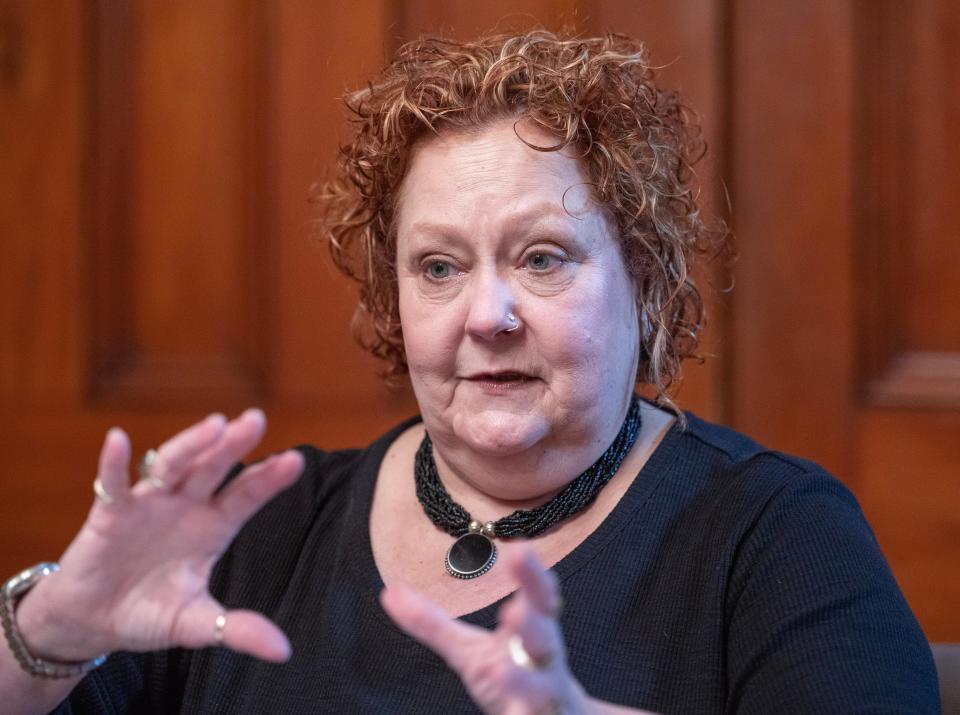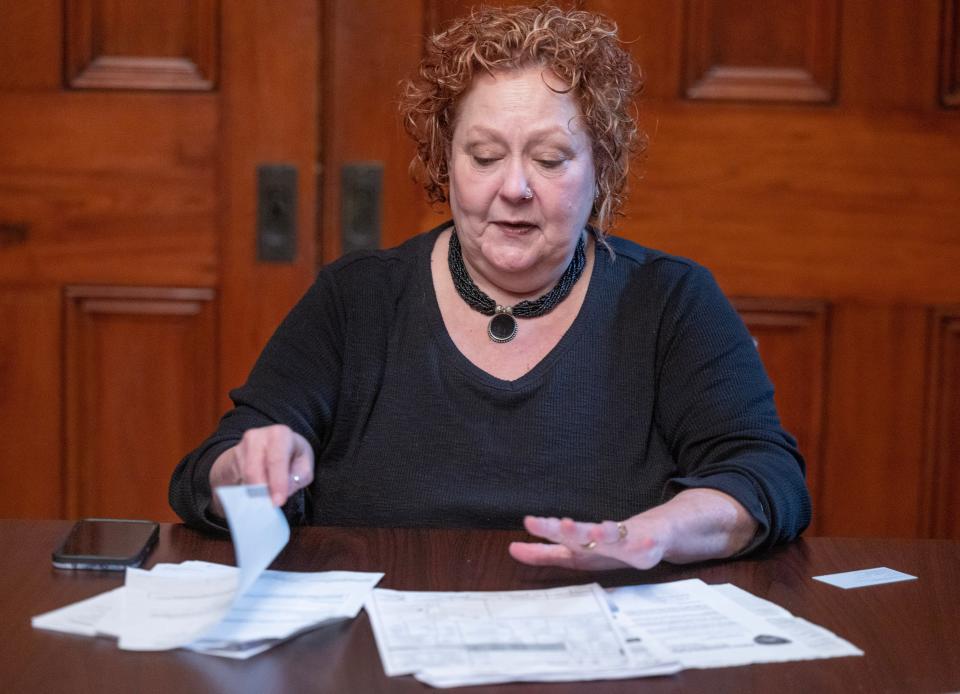Hurt in a car crash? If you get hit by the police, Ohio state law says the hurt is on you

MASSILLON ‒ Tami Huff was driving to the drugstore earlier this year when a Perry Township police car involved in a pursuit pulled out from a gas station and smashed into her brand-new 2023 Nissan Rogue, totaling her vehicle.
Getting hit by the cruiser cost her more than pain and suffering from neck and back injuries, headaches and the post-traumatic stress disorder that kicks in when she approaches an intersection. It's left her to bear thousands of dollars in expenses due to a state law involving sovereign immunity. She and her insurance company have to pay all her costs resulting from the accident, not the township government whose officer caused the crash.
She's had to absorb the cost of a new car deposit, an insurance deductible and medical expenses. She expects that her total cost from the crash will be close to $5,000.
Huff, 64, of Massillon does not blame the officer who hit her. She understands that he was doing his duty. But she is frustrated by the fact that she and her insurance company are forced to carry the total cost of damages and injuries she incurred as a result of the crash he caused.
"I have no recourse for anything because of what they call sovereign immunity," Huff said. "This is a very bad law."
What is sovereign immunity?
Sovereign immunity is one of several different types of interrelated immunities that protect governments and their employees from legal liability. Some types protect prosecutors, judges and legislators from being sued. Qualified immunity shields police officers from liability in many cases.
"Ordinarily a government, in particular state government, is going to be protected by sovereign immunity," said Mark Brown, a law professor at Capital University in Columbus, who is providing legal representation to the Ohio Coalition to End Qualified Immunity, which is trying to change the state law. "You can only sue them if they allow you to. If you want to sue Ohio, you've got to go to the Court of Claims."
Courts can also act to allow public entities to be sued, such as when the 6th U.S. Circuit Court of Appeals allowed former Ohio State University students to sue the institution over sexual abuse committed by the late Richard Strauss, a team doctor.
Federal, state and local govermental officials have qualified immunity that makes it hard to sue them for violations of the U.S. Constitution, said Brown, whose book, “Section 1983 Litigation,” focuses on constitutional and federal suits against states, municipalities and their officials.
"States have, for their own part, tended to adopt that for their own constitutional use," he said.
Governmental immunity predates the written laws of the state. It came to the New World as common law that American settlers brought from England, where monarchs enjoyed the right to be free from prosecution by their subjects.
"The king can do no wrong. That was the proposition," Brown said.
He said that only a very small number of people are able to win a case against the government for issues such as police brutality, due to the protection of qualified immunity.
"I've always been critical of qualified immunity," Brown said.
So is Joanna C. Schwartz, a law professor at the University of California at Los Angeles. She has written extensively on the subject of qualified immunity, including a book, "Shielded: How the Police Became Untouchable."
How does qualified immunity work?
"Qualified immunity shields officers from liability — even if they have violated the Constitution — if a plaintiff cannot find a prior court decision holding nearly identical facts to be unconstitutional," Schwartz wrote in an email. "It is equally — if not more — difficult to prove liability against a city, so if a plaintiff loses on qualified immunity they likely end up without remedy.
"A common defense of qualified immunity is that it is necessary to protect officers’ bank accounts. But officers are almost always indemnified — meaning the city pays settlements against them — even when they are denied qualified immunity," she wrote.
It's unclear how many people are impacted each year by governmental immunities or how much money is involved, as the Ohio Insurance Institute, the Ohio Coalition to End Qualified Immunity and others said they don't have any such statistics.
"We simply don’t know," Schwartz wrote. "To answer we would need not only to know the cases dismissed in whole or part because of immunities, but also to know how much those cases should have settled for, and to know how many cases were never brought."
Effort underway to end governmental immunities
The Ohio Coalition to End Qualified Immunity is trying to put an issue on the Nov. 5 general election ballot that aims to eliminate various immunities for the government and government workers, including qualified, sovereign, prosecutorial, and statutory immunities in civil cases.
The proposed constitutional amendment, if approved, would allow people to sue over claims that police or government workers violated their constitutional rights.
"We just want just compensation for people when their rights are violated," coalition spokesman Kyle Pierce said. "If you have no restitution for when government violates your rights, if there's nothing, if there's no consequences when government violates our rights, if there's nothing to protect our rights from being violated, do we actually have those rights?"
The coalition faces a July 3 deadline to file its petitions to get the question on the Nov. 5 ballot.
Passage of the issue wouldn't help Huff, because the accident that affected her is history. But she worries about how other people would fare if they had the same experience.
"I count my blessings that I'm in a position that I was able to come up with the money for a second downpayment on my car that I shouldn't have to make," Huff said. "What if it was someone who was barely making it, had minimal coverage on their car, had no way of coming up with the downpayment to replace their car? Someone else, who, if they didn't have the ability to get a car, their lives could be ruined."

Immunity protects governments from liability
Her opinion is the opposite of Perry Township's position.
"The Township's immunity, as a political subdivision, is entrusted by Ohio law," township Administrator Joyce E. Fetzer-Martin wrote in an email to the Canton Repository. "It has long been recognized that such immunity is, in part, to protect the resources of local communities. The Township's carrier will determine whether immunity is applicable in this matter. Ohio law, as part of the immunity rules, also limits recoveries when certain losses are covered by insurance."
She sent the newspaper an excerpt from state law that says, in part, "the protections afforded to political subdivisions and employees of political subdivisions by this act are urgently needed in order to ensure the continued orderly operation of local governments to provide public peace, health, and safety services to their residents."
The immunity afforded to political subdivisions specifically covers police operating motor vehicles on emergency calls, provided there was no "willful or wanton misconduct."
What happened in Perry Township crash?
On Feb. 10, Huff was westbound on state Route 172 and approaching the intersection at 27th Street when the Perry Township cruiser pulled from the driveway of the BP gas station into the front of the driver's side of her Rogue shortly before 9 p.m.
The impact destroyed her car's braking ability.
"A few inches to the right, how he hit me, and I might not even be here to talk to you today. That's how hard he hit me," Huff said. "It was pretty scary. It's one thing when you're in an accident. The sound of metal on metal is terrible. But when you look out and you think, 'Oh my gosh, I just got hit by a police cruiser. What the heck?' It's a whole different experience.
"I didn't know he existed until he hit me. He didn't have his lights on. He didn't have his siren on — nothing," she said.
Huff had to drive onto the curb to avoid hitting the vehicle in front of her. The Rogue stopped on the sidewalk.

Crash victim disappointed by police department public statement
In addition to her economic damages and physical injuries, Huff is also disappointed in the public position taken by the Perry Township Police Department about the collision in which she was injured. Police Chief Bryan Taylor posted a press release on the next day that said a cruiser was damaged, but there were no reported injuries to members of the public or officers.
Official statement: Police chase through parts of Stark County leaves Perry Township cruiser damaged
"My car was killed. I was injured," she said. "Neck and back injuries. ... I didn't need it, and now I'm seeing a chiropractor for my neck and my back."
She didn't go to the hospital on the Saturday night when the crash occurred. But by the following Monday evening, the pain sent her to the emergency room.
"I was really starting to bruise, and have some pain. I either strained or sprained pretty much everything on my left-hand side where he hit me and also had a cracked rib," Huff said.
The crash report prepared by the Ohio State Highway Patrol said she was suspected of having serious injury. The 24-year-old township police officer who was driving the 2018 Ford Explorer was not injured, according to the report. The report indicates the officer was cited.
Reach Nancy at 330-580-8382 or nancy.molnar@cantonrep.com. On X, formerly known as Twitter: @nmolnarTR.
This article originally appeared on The Repository: Why an Ohio woman is stuck with bills after being hit by police car

